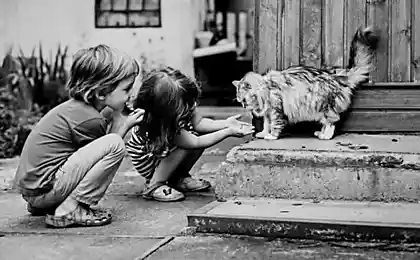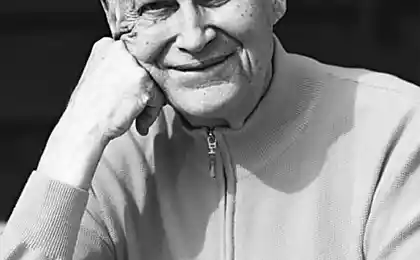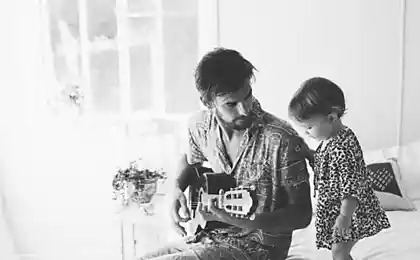248
What fate will we give our children?
Like all habits, good habits in children are developed through repetition with positive reinforcement, and usually a period of 20 to 40 days is sufficient. However, there are situations when parents daily remind children to brush their teeth and do exercises in the morning, children reluctantly do it every time, but good habits are not developed - for years!

What's the reason?
The reason is precisely what children do every time - reluctantly.
Children do not just go brushing their teeth, but do it with a disgruntled face and internal (or even external) rumble. Make charging stressed lazy and dissatisfied... What skills do they learn and strengthen every day? They daily strengthen the habit of dissatisfaction with brushing their teeth and exercising in the morning, they daily reinforce the reluctance to do it, day after day form the habit of not wanting to do it.
What conclusion? Follow the format: how children go to brush their teeth and how they do exercises. How? Boudreau and with pleasure! That's exactly what we need to watch!
In any case, it turns out that not only the content, but also the form is important. You’ve got your child doing lessons – in fact, they’re doing them. But how? Sad and unhappy? This is not good, in this design, lessons will not be properly done. With each hour of such preparation of lessons, the child will learn not so much the knowledge of the Russian language or history, but the fact that lessons are longing and suck.
If a month in the morning do exercises, there is a habit of doing exercises in the morning. But if a month in the morning to do exercises, accompanied by dreary comments and unhappy facial expressions, there is a habit of morning longing and hatred of exercise. That is why the army for recruits begins with a format: with training in how to stand, walk and talk: stand without curvatures, walk together, talk about business.
So again:
One of the most important things we need to teach our children is
Do nothing unwillingly, do everything only cheerfully and with pleasure. And to achieve this is easy: you saw the sour face of the child and his unfortunate lowered shoulders - tell him to correct it. Elementary? Will you?
I want to tell you a story: a very important story. Perhaps it was from this story that I began to change my views on what parenting should be like and what is most important about it.
So it was in the village, my son Shura graduated from grade 2, and the school said he was a little weak in math. I decided to study with him. I say, "Shura, no fishing or partying, bring your briefcase here, we will study." Shura objected, but to no avail, then wandered for a briefcase, dragging him. I said, No, Shura, you don't wear a briefcase. Take it back and bring it back. Go a dozen times. Until you get your briefcase right, we won't sit down and you won't go out. Shura whined, but soon realized that there were no options, and for some time he brought a briefcase properly: calm, cheerful and cheerful, like a young pioneer. The next step is not to throw the portfolio on the table, but to put it carefully. We've done that, too. He thought that he took out the notebook, casually threw it on the table, but here he met resistance: “No, Shura, don’t drop it, put it down.” And the right corner is above the left.” All right, I fixed my notebook, and then I sat down on my elbows, kind of tired. And I corrected it, and I said, No, Shur, we don't do lessons like that. Sit down, hold the back, shoulders, handles correctly.”
Thus began the struggle for the format: Shura defended his right to do his lessons as he wanted, and I calmly insisted that it would not be as he wanted, but as it should be.
It is clear that Shura, like a normal child, was in every possible way looking for an opportunity to portray how hard and bad it is for him when he is so driven by a nasty parent. But I stood adamantly: Shura, there will be no lessons for you if you stay in this format. In the beginning you will have a normal back and a normal face.”
Shura straightened his face and back, sat down normally, but when I began to ask him questions, I wailed again: “Dad, I don’t know anything about this mathematics!” My answer sounded confident: “Shura, you are confused.” Learn the text: "I'm smart." I'm stronger than mathematics, I can do math. My dad is next to me and he will help me.” A few skirmishes, and soon Shura after me already repeated this text: "I'm smart, I can cope with mathematics, I'm stronger than mathematics!"
It was a will fight. He sought every opportunity to express his protest and his feelings, but I forbade him from his protests and all his feelings when he showed with all his appearance that all this study had wept and tired him. The next item was his handwriting. Yes, his handwriting was not beautiful before, but then Shura began to write completely dissatisfied with curved letters. What do I do with my handwriting? I said, “Shura, you write like you’re tormented by life.” You must have forgotten how to spell beech. Let's leave mathematics with you and learn to write the elements of letters. Write a line of circles and a line of sticks. If you do not write well, we will return to the first class. Shura wrote some lines, then said, "Dad, I remembered how to write normally."
You know, the first day was hard. It was the day we set the format, and we set it. It was a victory! After this difficult day, everything went easy. Now Shura always had a great mood, which was created by the fact that I reminded him of this and made sure that he did everything fun and did not spoil his mood. It was a new era!
Curiously, we studied so well that Shura successfully repeated the whole last year and half of the future in one month. This, by the way, created problems: the next year, in the third grade, the math teacher complained about Shura, because he solved all the problems in her lessons perfectly, but frankly missed her.
Today, as I write this, Shura is 28 years old. I wanted to clarify with him the details of this story, but it turned out that he remembers almost nothing and doubts at all that it was. It’s good that my mother remembered more, and through joint efforts we restored the main points. Interestingly, a couple of years ago I asked Shura what he thought about his childhood and how we raised him. Shura thought and said something very unexpected for me. He said, "You could have been stricter."
Yeah, he's right. Vanya and Shura were my first children, I had just mastered the science of parenting and at that time was a proponent of free parenting. As a graduate of the Department of Psychology at Moscow State University, I was in awe of the views of Carl Rogers, believed in an unconditionally positive beginning in each person and was convinced that my main task as a parent was to create an environment of understanding and support in which he would freely develop and exercise his own choices.
I don't think so today. Having raised five children – beautiful children! – I changed my views on education. And it was the summer when I spent my summer days with Shura that laid the foundation for my new views.
Yeah, I've understood the power of format ever since. I learned how important it is not to let kids do all these crooked faces that show you what tormentors you are. Parents, don’t be afraid of the “suppressed emotions” that scare you, and make sure that your child does not get used to acting like an unhappy creature. A pattern of behavior, again, becomes a habit, a habit becomes a character, and character builds destiny.
What fate will we give to our children?
Author: N.I. Kozlov
P.S. And remember, just by changing our consumption – together we change the world!
Source: www.psychologos.ru/articles/view/o_formatezpt_ili_kakuyu_sudbu_my_podarim_nashim_detyam_vop_zn_

What's the reason?
The reason is precisely what children do every time - reluctantly.
Children do not just go brushing their teeth, but do it with a disgruntled face and internal (or even external) rumble. Make charging stressed lazy and dissatisfied... What skills do they learn and strengthen every day? They daily strengthen the habit of dissatisfaction with brushing their teeth and exercising in the morning, they daily reinforce the reluctance to do it, day after day form the habit of not wanting to do it.
What conclusion? Follow the format: how children go to brush their teeth and how they do exercises. How? Boudreau and with pleasure! That's exactly what we need to watch!
In any case, it turns out that not only the content, but also the form is important. You’ve got your child doing lessons – in fact, they’re doing them. But how? Sad and unhappy? This is not good, in this design, lessons will not be properly done. With each hour of such preparation of lessons, the child will learn not so much the knowledge of the Russian language or history, but the fact that lessons are longing and suck.
If a month in the morning do exercises, there is a habit of doing exercises in the morning. But if a month in the morning to do exercises, accompanied by dreary comments and unhappy facial expressions, there is a habit of morning longing and hatred of exercise. That is why the army for recruits begins with a format: with training in how to stand, walk and talk: stand without curvatures, walk together, talk about business.
So again:
One of the most important things we need to teach our children is
Do nothing unwillingly, do everything only cheerfully and with pleasure. And to achieve this is easy: you saw the sour face of the child and his unfortunate lowered shoulders - tell him to correct it. Elementary? Will you?
I want to tell you a story: a very important story. Perhaps it was from this story that I began to change my views on what parenting should be like and what is most important about it.
So it was in the village, my son Shura graduated from grade 2, and the school said he was a little weak in math. I decided to study with him. I say, "Shura, no fishing or partying, bring your briefcase here, we will study." Shura objected, but to no avail, then wandered for a briefcase, dragging him. I said, No, Shura, you don't wear a briefcase. Take it back and bring it back. Go a dozen times. Until you get your briefcase right, we won't sit down and you won't go out. Shura whined, but soon realized that there were no options, and for some time he brought a briefcase properly: calm, cheerful and cheerful, like a young pioneer. The next step is not to throw the portfolio on the table, but to put it carefully. We've done that, too. He thought that he took out the notebook, casually threw it on the table, but here he met resistance: “No, Shura, don’t drop it, put it down.” And the right corner is above the left.” All right, I fixed my notebook, and then I sat down on my elbows, kind of tired. And I corrected it, and I said, No, Shur, we don't do lessons like that. Sit down, hold the back, shoulders, handles correctly.”
Thus began the struggle for the format: Shura defended his right to do his lessons as he wanted, and I calmly insisted that it would not be as he wanted, but as it should be.
It is clear that Shura, like a normal child, was in every possible way looking for an opportunity to portray how hard and bad it is for him when he is so driven by a nasty parent. But I stood adamantly: Shura, there will be no lessons for you if you stay in this format. In the beginning you will have a normal back and a normal face.”
Shura straightened his face and back, sat down normally, but when I began to ask him questions, I wailed again: “Dad, I don’t know anything about this mathematics!” My answer sounded confident: “Shura, you are confused.” Learn the text: "I'm smart." I'm stronger than mathematics, I can do math. My dad is next to me and he will help me.” A few skirmishes, and soon Shura after me already repeated this text: "I'm smart, I can cope with mathematics, I'm stronger than mathematics!"
It was a will fight. He sought every opportunity to express his protest and his feelings, but I forbade him from his protests and all his feelings when he showed with all his appearance that all this study had wept and tired him. The next item was his handwriting. Yes, his handwriting was not beautiful before, but then Shura began to write completely dissatisfied with curved letters. What do I do with my handwriting? I said, “Shura, you write like you’re tormented by life.” You must have forgotten how to spell beech. Let's leave mathematics with you and learn to write the elements of letters. Write a line of circles and a line of sticks. If you do not write well, we will return to the first class. Shura wrote some lines, then said, "Dad, I remembered how to write normally."
You know, the first day was hard. It was the day we set the format, and we set it. It was a victory! After this difficult day, everything went easy. Now Shura always had a great mood, which was created by the fact that I reminded him of this and made sure that he did everything fun and did not spoil his mood. It was a new era!
Curiously, we studied so well that Shura successfully repeated the whole last year and half of the future in one month. This, by the way, created problems: the next year, in the third grade, the math teacher complained about Shura, because he solved all the problems in her lessons perfectly, but frankly missed her.
Today, as I write this, Shura is 28 years old. I wanted to clarify with him the details of this story, but it turned out that he remembers almost nothing and doubts at all that it was. It’s good that my mother remembered more, and through joint efforts we restored the main points. Interestingly, a couple of years ago I asked Shura what he thought about his childhood and how we raised him. Shura thought and said something very unexpected for me. He said, "You could have been stricter."
Yeah, he's right. Vanya and Shura were my first children, I had just mastered the science of parenting and at that time was a proponent of free parenting. As a graduate of the Department of Psychology at Moscow State University, I was in awe of the views of Carl Rogers, believed in an unconditionally positive beginning in each person and was convinced that my main task as a parent was to create an environment of understanding and support in which he would freely develop and exercise his own choices.
I don't think so today. Having raised five children – beautiful children! – I changed my views on education. And it was the summer when I spent my summer days with Shura that laid the foundation for my new views.
Yeah, I've understood the power of format ever since. I learned how important it is not to let kids do all these crooked faces that show you what tormentors you are. Parents, don’t be afraid of the “suppressed emotions” that scare you, and make sure that your child does not get used to acting like an unhappy creature. A pattern of behavior, again, becomes a habit, a habit becomes a character, and character builds destiny.
What fate will we give to our children?
Author: N.I. Kozlov
P.S. And remember, just by changing our consumption – together we change the world!
Source: www.psychologos.ru/articles/view/o_formatezpt_ili_kakuyu_sudbu_my_podarim_nashim_detyam_vop_zn_
How to create your own seed Bank
13 wonderful women over 60, who seem to with age become more beautiful























